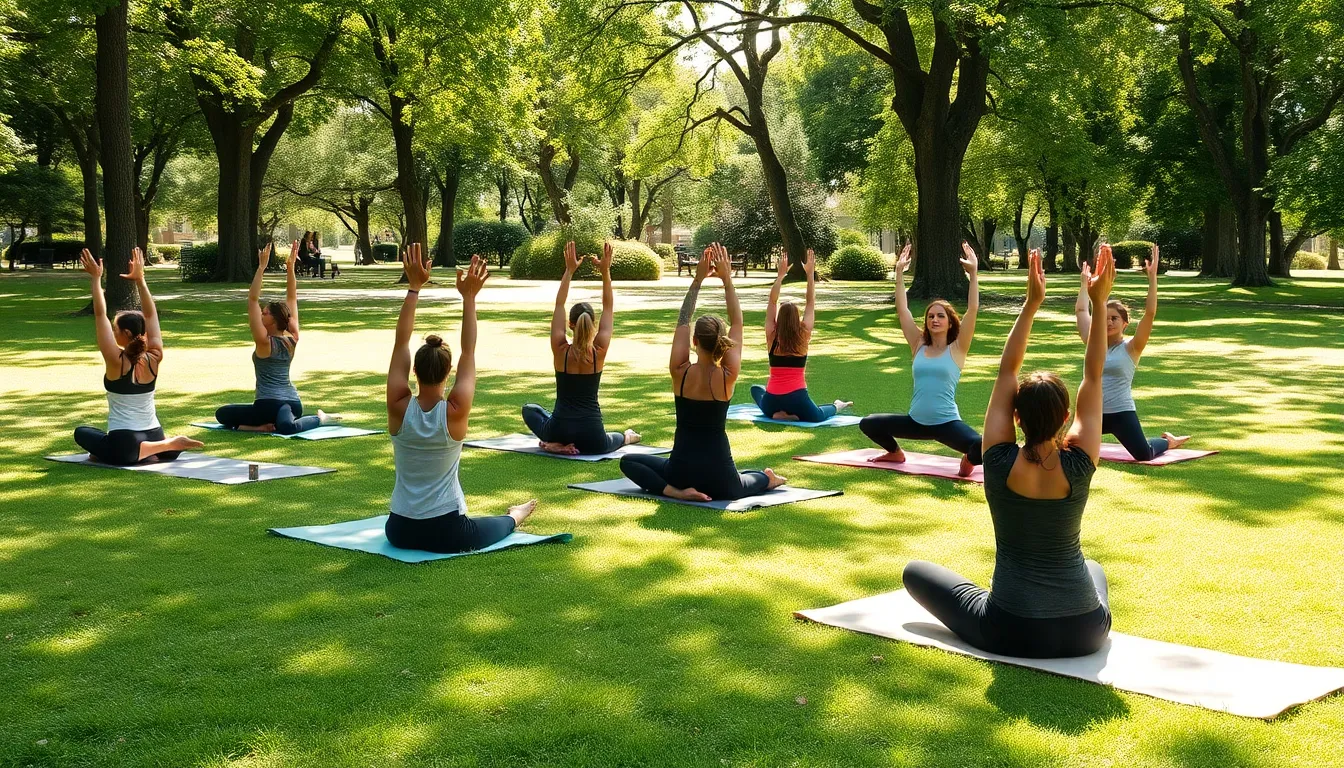In a world where quick fixes and miracle diets reign supreme, holistic health swoops in like a superhero ready to save the day. It’s not just about what’s on your plate; it’s about nourishing your mind, body, and spirit. Imagine a health approach that doesn’t just treat symptoms but embraces the whole you—sounds like a dream, right? Spoiler alert: it’s not!
Table of Contents
ToggleUnderstanding Holistic Health
Holistic health focuses on a comprehensive approach to well-being that integrates the mind, body, and spirit. This perspective shifts from merely treating symptoms to nurturing all aspects of an individual’s life.
Definition of Holistic Health
Holistic health is an approach that emphasizes the interconnectedness of various factors affecting a person’s health. It encompasses physical, emotional, mental, and spiritual well-being, recognizing that each aspect influences the others. Practitioners often provide personalized solutions that address lifestyle choices, emotional health, and spiritual fulfillment, helping individuals achieve balance and harmony.
Principles of Holistic Health
Holistic health operates on several key principles. Balance plays a vital role in maintaining overall wellness. Prevention signifies the importance of proactive measures to avoid health issues before they arise. Additionally, the concept of the individual emphasizes tailored care that meets unique needs. Mindfulness encourages staying present, enhancing awareness of thoughts and emotions. Finally, community underscores the significance of social connections in supporting health, demonstrating that relationships positively impact well-being.
Benefits of Holistic Health

Holistic health offers numerous benefits that contribute to an individual’s overall well-being. By addressing the mind, body, and spirit, it enables a more balanced approach to health and happiness.
Physical Benefits
Physical health improves significantly under holistic practices. Individuals often experience increased energy levels and enhanced vitality from regular exercise and proper nutrition. Nutrition emphasizes whole foods, which can lead to better digestion and weight management. Incorporating natural remedies in place of pharmaceuticals promotes a quicker recovery from illnesses. Regular practices like yoga and meditation strengthen the body while promoting flexibility. These holistic approaches also encourage consistent preventive care, resulting in fewer chronic health issues.
Mental and Emotional Benefits
Mental clarity and emotional stability are crucial elements of holistic health. People often find reduced stress and anxiety through mindfulness and meditation techniques. Emotional health improves as individuals gain insights into their thoughts and feelings. Practicing self-care fosters a positive self-image and builds resilience. Connections with supportive communities enhance emotional well-being and create a sense of belonging. Individuals who embrace holistic health frequently report heightened creativity and improved productivity. Fostering these mental attributes contributes to a more fulfilling and balanced life.
Key Components of Holistic Health
Holistic health encompasses various elements that contribute to overall well-being. Individuals achieve balance through the integration of nutrition, physical activity, mindfulness, and other lifestyle factors.
Nutrition and Diet
Nutrition forms the foundation of holistic health. Whole foods, including fruits, vegetables, whole grains, and lean proteins, supply essential nutrients. Adequate hydration plays a crucial role, as water supports cellular functions and energy levels. Reducing processed foods and sugars helps maintain stable energy throughout the day. Nutritional choices should focus on variety, ensuring that individuals receive a wide array of vitamins and minerals. Tailoring dietary approaches to personal needs and preferences enhances adherence and enjoyment.
Exercise and Physical Activity
Physical activity significantly impacts holistic health. Exercise boosts cardiovascular health while improving strength and flexibility. Engaging in activities like walking, running, cycling, or swimming enhances mood through the release of endorphins. Incorporating diverse exercises keeps routines interesting and prevents boredom. Regular physical activity supports weight management and contributes to overall vitality. Finding enjoyable fitness options fosters consistency, making it easier for individuals to stay active.
Mindfulness and Stress Management
Mindfulness practices enrich holistic health by promoting emotional balance and mental clarity. Techniques like meditation, deep breathing, and yoga reduce stress levels, encouraging relaxation. Recognizing and addressing stressors leads to healthier responses and more effective coping strategies. Engaging in regular mindfulness practices helps individuals cultivate self-awareness. Building a daily routine that includes these practices fosters resilience, ultimately improving overall well-being. Integrating mindfulness into day-to-day life can lead to enhanced focus and productivity.
Holistic Health Practices
Holistic health practices encompass a wide range of approaches that promote overall well-being through natural methods. These practices address the whole person, integrating different health aspects.
Alternative Therapies
Alternative therapies enhance traditional medical approaches by offering complementary options. Acupuncture uses thin needles to stimulate specific body points, promoting balance and healing. Chiropractic adjustments focus on spinal alignment to improve function and relieve pain. Aromatherapy harnesses essential oils to impact mood and emotional well-being positively. Massage therapy alleviates muscle tension and enhances relaxation through various techniques. Each of these therapies provides unique benefits that contribute to holistic health.
Integrative Medicine
Integrative medicine combines conventional and alternative therapies for a comprehensive treatment plan. This approach prioritizes patient-centered care and emphasizes the therapeutic relationship between providers and individuals. Nutritional counseling promotes well-being by tailoring dietary recommendations that fit each person’s needs. Mind-body techniques like meditation and yoga foster emotional and physical health. Furthermore, lifestyle modifications target areas such as sleep, exercise, and stress management, supporting individuals in achieving harmony.
Challenges in Holistic Health
Holistic health faces unique challenges that can hinder its widespread acceptance and effectiveness.
Misconceptions and Criticism
Misunderstandings about holistic health often arise from its alternative nature. Critics question its scientific validity, associating it with unproven methods. Some people believe holistic practices ignore conventional medicine, creating skepticism among potential supporters. A lack of standardized approaches contributes to varied experiences and outcomes, making it hard for individuals to trust holistic solutions. Clarifying these misconceptions is essential to improving public perception.
Accessibility and Acceptance
Accessing holistic health options remains a challenge for many individuals. Availability of practitioners can vary significantly based on location, limiting choices for some. Insurance coverage for holistic treatments often falls short, making affordability a concern. Cultural acceptance also impacts engagement; certain communities may prefer traditional approaches over alternative solutions. Promoting education and awareness about holistic methods can enhance acceptance, broadening access for all.
Embracing holistic health can lead to a transformative journey toward well-being. By recognizing the interconnectedness of mind, body, and spirit, individuals can cultivate a more balanced and fulfilling life. This approach not only addresses physical health but also nurtures emotional and mental resilience.
As more people seek alternatives to conventional methods, holistic practices offer a comprehensive path to wellness. Through personalized care and community support, individuals can achieve lasting benefits that enhance their quality of life. The journey toward holistic health is not just about treatment; it’s about fostering a lifestyle that prioritizes harmony and balance in every aspect of existence.


